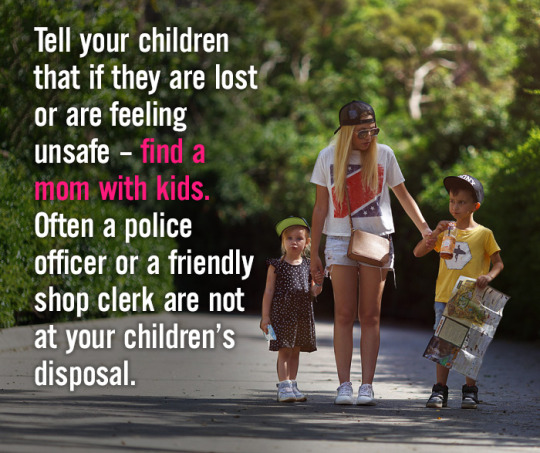Text

19.9.2018
3/100 of productivity
Studying microbiology 😄
4 notes
·
View notes
Text

2/100
18.9.2018
Watching skechymicro to memorize microbe’s characteristics in a fun way😍
2 notes
·
View notes
Text

1/100
17.9.2018
Looking for a topic to research about for our upcoming community research project 😃
0 notes
Photo

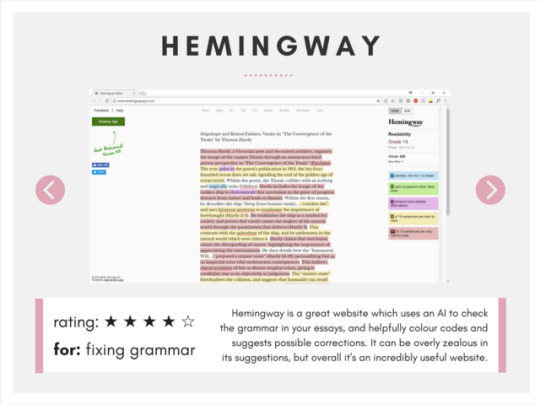

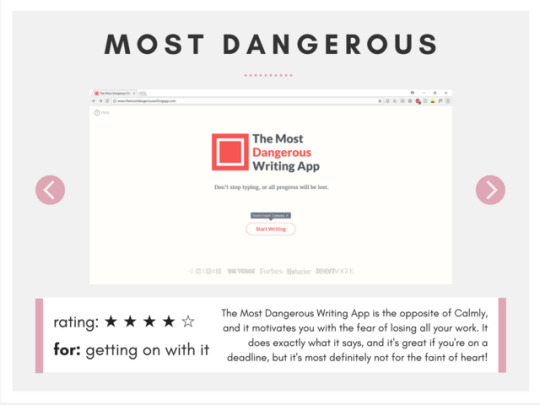
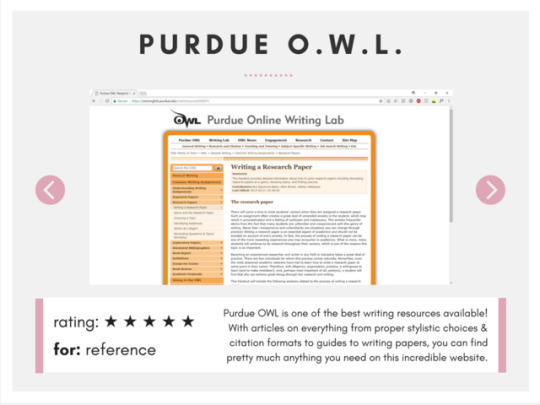

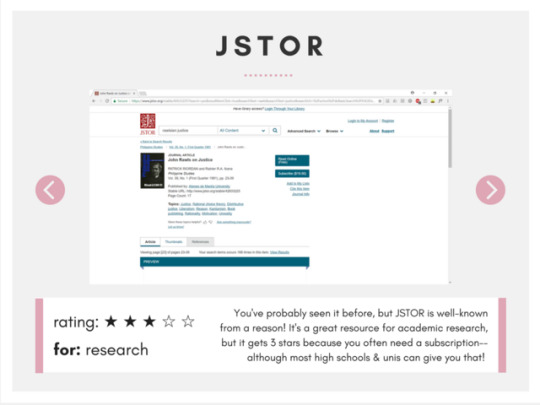

Here’s some weapons for your essay writing arsenal!
Hemingway Editor Calmly Writer The Most Dangerous Writing App Purdue O.W.L. One Look Thesaurus JSTOR Google Scholar
Reply with your favourite or other great websites I didn’t include!
71K notes
·
View notes
Text
Tips to learn a new language
The 75 most common words make up 40% of occurrences The 200 most common words make up 50% of occurrences The 524 most common words make up 60% of occurrences The 1257 most common words make up 70% of occurrences The 2925 most common words make up 80% of occurrences The 7444 most common words make up 90% of occurrences The 13374 most common words make up 95% of occurrences The 25508 most common words make up 99% of occurrences
(Sources: 5 Steps to Speak a New Language by Hung Quang Pham)
This article has an excellent summary on how to rapidly learn a new language within 90 days.
We can begin with studying the first 600 words. Of course chucking is an effective way to memorize words readily. Here’s a list to translate into the language you desire to learn that I grabbed from here! :)
EXPRESSIONS OF POLITENESS (about 50 expressions)
‘Yes’ and ‘no’: yes, no, absolutely, no way, exactly.
Question words: when? where? how? how much? how many? why? what? who? which? whose?
Apologizing: excuse me, sorry to interrupt, well now, I’m afraid so, I’m afraid not.
Meeting and parting: good morning, good afternoon, good evening, hello, goodbye, cheers, see you later, pleased to meet you, nice to have met.
Interjections: please, thank you, don’t mention it, sorry, it’ll be done, I agree, congratulations, thank heavens, nonsense.
NOUNS (about 120 words)
Time: morning, afternoon, evening, night; Sunday, Monday, Tuesday, Wednesday, Thursday, Friday, Saturday; spring, summer, autumn, winter; time, occasion, minute, half-hour, hour, day, week, month, year.
People: family, relative, mother, father, son, daughter, sister, brother, husband, wife; colleague, friend, boyfriend, girlfriend; people, person, human being, man, woman, lady, gentleman, boy, girl, child.
Objects: address, bag, book, car, clothes, key, letter (=to post), light (=lamp), money, name, newspaper, pen, pencil, picture, suitcase, thing, ticket.
Places: place, world, country, town, street, road, school, shop, house, apartment, room, ground; Britain, name of the foreign country, British town-names, foreign town-names.
Abstract: accident, beginning, change, color, damage, fun, half, help, joke, journey, language, English, name of the foreign language, letter (of alphabet), life, love, mistake, news, page, pain, part, question, reason, sort, surprise, way (=method), weather, work.
Other: hand, foot, head, eye, mouth, voice; the left, the right; the top, the bottom, the side; air, water, sun, bread, food, paper, noise.
PREPOSITIONS (about 40 words)
General: of, to, at, for, from, in, on.
Logical: about, according-to, except, like, against, with, without, by, despite, instead of.
Space: into, out of, outside, towards, away from, behind, in front of, beside, next to, between, above, on top of, below, under, underneath, near to, a long way from, through.
Time: after, ago, before, during, since, until.
DETERMINERS (about 80 words)
Articles and numbers: a, the; nos. 0–20; nos. 30–100; nos. 200–1000; last, next, 1st–12th.
Demonstrative: this, that.
Possessive: my, your, his, her, its, our, their.
Quantifiers: all, some, no, any, many, much, more, less, a few, several, whole, a little, a lot of.
Comparators: both, neither, each, every, other, another, same, different, such.
ADJECTIVES (about 80 words)
Color: black, blue, green, red, white, yellow.
Evaluative: bad, good, terrible; important, urgent, necessary; possible, impossible; right, wrong, true.
General: big, little, small, heavy; high, low; hot, cold, warm; easy, difficult; cheap, expensive; clean, dirty; beautiful, funny (=comical), funny (=odd), usual, common (=shared), nice, pretty, wonderful; boring, interesting, dangerous, safe; short, tall, long; new, old; calm, clear, dry; fast, slow; finished, free, full, light (=not dark), open, quiet, ready, strong.
Personal: afraid, alone, angry, certain, cheerful, dead, famous, glad, happy, ill, kind, married, pleased, sorry, stupid, surprised, tired, well, worried, young.
VERBS (about 100 words)
arrive, ask, be, be able to, become, begin, believe, borrow, bring, buy, can, change, check, collect, come, continue, cry, do, drop, eat, fall, feel, find, finish, forget, give, going to, have, have to, hear, help, hold, hope, hurt (oneself), hurt (someone else), keep, know, laugh, learn, leave, lend, let (=allow), lie down, like, listen, live (=be alive), live (=reside), look (at), look for, lose, love, make, may (=permission), may (=possibility), mean, meet, must, need, obtain, open, ought to, pay, play, put, read, remember, say, see, sell, send, should, show, shut, sing, sleep, speak, stand, stay, stop, suggest, take, talk, teach, think, travel, try, understand, use, used to, wait for, walk, want, watch, will, work (=operate), work (=toil), worry, would, write.
PRONOUNS (about 40 words)
Personal: I, you, he, she, it, we, they, one; myself, yourself, himself, herself, itself, ourselves, yourselves, themselves.
Possessive: mine, yours, his, hers, its, ours, theirs.
Demonstrative: this, that.
Universal: everyone, everybody, everything, each, both, all, one, another.
Indefinite: someone, somebody, something, some, a few, a little, more, less; anyone, anybody, anything, any, either, much, many.
Negative: no-one, nobody, nothing, none, neither.
ADVERBS (about 60 words)
Place: here, there, above, over, below, in front, behind, nearby, a long way away, inside, outside, to the right, to the left, somewhere, anywhere, everywhere, nowhere, home, upstairs, downstairs.
Time: now, soon, immediately, quickly, finally, again, once, for a long time, today, generally, sometimes, always, often, before, after, early, late, never, not yet, still, already, then (=at that time), then (=next), yesterday, tomorrow, tonight.
Quantifiers: a little, about (=approximately), almost, at least, completely, very, enough, exactly, just, not, too much, more, less.
Manner: also, especially, gradually, of course, only, otherwise, perhaps, probably, quite, so, then (=therefore), too (=also), unfortunately, very much, well.
CONJUNCTIONS (about 30 words)
Coordinating: and, but, or; as, than, like.
Time & Place: when, while, before, after, since (=time), until; where.
Manner & Logic: how, why, because, since (=because), although, if; what, who, whom, whose, which, that.
240K notes
·
View notes
Text
A GUIDE FOR EVERY STUDENT: HOW TO STUDY SMARTER AND NOT HARDER!
A lot of us have difficulty when it comes to learning all types of new information. Especially when we’ve got other priorities to worry about. After much experimentation, I’ve found that the following tips helped me make the most of my time and also helped me plan much more fruitful study sessions!
- Designated Study Area.
A coffee shop, the library, a desk, or even your bed. Figure out where you are most comfortable studying - The right location provides comfort, no distractions and is quiet. Another factor to consider is timing. Are you a morning person, an evening person or a night person? Combine the time with the location and there’s your study area!
- The Key to Success is Time Management.
Plan your time using a simple schedule template, or make a simple to-do-list. The trick is to complete short tasks in a reasonable amount of time; like going over 5 pages of a textbook in approimately 15 minutes. Keeping a written schedule keeps you in line, and this way you won’t forget the tasks you need to complete for the day!
- Note Taking.
Personally, I like to keep a hardcopy of the days lecture and just scribble down any information that I think is important. BUT, there are some pretty cool note-taking strategies out there that you can utilise. Check out The Cornell Method, Mind Mapping, and the Split Page Method. Active learning produces more results than passive learning - so write down those notes and stay active!
- Meet the Syllabus.
The syllabus outlines the most important learning outcomes/ learning goals, and thats pretty much all you need to plan a productive studying session.
Bid farewell to all that extra, unnecessary information.
- What is your learning style?
Are you a visual, auditory, verbal or kinesthetic learner? Experiment with all 3 and find out which one works best for you. You don’t necessarily need to stick with one! Do you study better alone or do you prefer group study?
- Bite-sized Learning.
Do not try to cram in a huge amount of information all at once. Instead, try breaking information down into learnable, manageable chunks. Combining this method with tip #2 will help you make the most of your time.
- Review, Review, Review!
It’s scientifically proven that the more you review material, the easier it’ll be for you to recall it when needed. So, take another look at your notes a couple of days after you make them, then again a week later, and so on.
These are the main tips I’ve found to be of help, and I hope they’re of use to everyone else!
5K notes
·
View notes
Text
Medical School Resources! (and other human biology,physiology,biochemistry-related resources)
Hi Everyone!
Update: I am now officially done with my second year! I know i’ve been MIA on here for a while now - but that’s only because I was drowning in textbooks and assignments! I will be writing a whole other post on what my second year in medical school was like - so watch out for that :)
I, for one, can not just rely on one method of learning. Meaning, I’ll jump from videos, to textbooks, to flashcards. In this post I’m going to list some of my holy grail youtube channels that have helped saved me.
1) Handwritten Tutorials
https://www.youtube.com/user/harpinmartin
Every video in this channel is short, but not so much that you feel like you’re missing out on information. Definitely one to save as a favourite!
2) Armando Hasudungan
https://www.youtube.com/user/armandohasudungan
The best thing about this channel is the fact that there are over 300 videos, covering a wide range of core topics in endocrinology, neurology, physiology and pharmacology. Another pro is the presentation of topics (otherwise considered snooze-worthy) in an artistic manner!
3) Speed Pharmacology
https://www.youtube.com/channel/UC-i2EBYXH6-GAglvuDIaufQ
Raise your hand if you’ve ever fallen asleep trying to read about the mechanism of action of opioids, their side effects and contraindications. I know I have. Fret not, for this youtube channel will introduce you to a world where pharmacology is actually interesting.
4) Wendy Riggs
https://www.youtube.com/user/wendogg1
Wendy Riggs is a very down-to-earth professor in Northern California, and she covers a wide range of topics in Anatomy, Physiology and General Biology.
5) Anatomy Zone
https://www.youtube.com/user/TheAnatomyZone
A better way to learn anatomy is to supplement your textbook information with videos from this channel. The explanations and visuals provided are absolute gold.
I hope you all find these channels as helpful as I did!
7K notes
·
View notes
Quote
If you get tired, learn to rest, not to quit.
Banksy
We often feel like giving up because it’s too hard or too tiring. Just take a break, maybe a small break, or a long break. Rest, get motivated again, do what you need to do so that you can come back and keep working hard. Make yourself proud.
(via fightostudy)
13K notes
·
View notes
Photo




Crystals of the female hormone oxytocin
In women this hormone is secreted naturally by the pituitary gland. Oxytocin causes contractions of the uterus during labour, and it also stimulates the flow of milk in women who are breast-feeding.
1K notes
·
View notes
Text
How to recover an unsaved draft on Microsoft Word
This literally saved my ass a few minutes ago. Yes, you can recover those files that you accidentally closed and thought you couldnt get back.
Right after that happens, open Microsoft Word again and click File - Info - Manage Versions - Recover Unsaved Documents.
It is literally that simple.
737K notes
·
View notes
Photo

This is my cat showing her best “you should really start to study” face 😼😸
7K notes
·
View notes
Photo

it’s 12:55 AM 😩studying hard and it feels great at least i did a non zero task day 😄👏
1 note
·
View note
Photo

•190816• 61/100 days of productivity
this week has been sO HECTIC. bio, ss and geog + math two days in a row???? that’s illegal. but on the flip side, i’m rather satisfied with my chinese o level results!! ⁽͑˙ˆ˙̫ˆ˙⁾̉ congrats to all who received their results yesterday,,, no matter what you got, you did your best + there’s a second chance!!✨
6K notes
·
View notes
Photo

Im currently studying from Khan academy “ the circulatory system 😍”
1 note
·
View note
Quote
Educate yourself. When a question about a certain topic pops up, google it. Watch movies and documentaries. When something sparks your interest, read about it. Read read read. Study, learn, stimulate your brain. Don’t just rely on the school system, educate that beautiful mind of yours.
Unknown (via wordsnquotes)
9K notes
·
View notes



